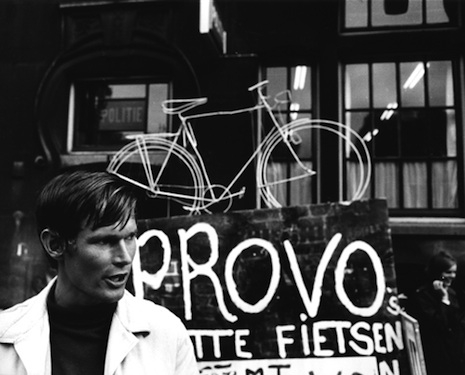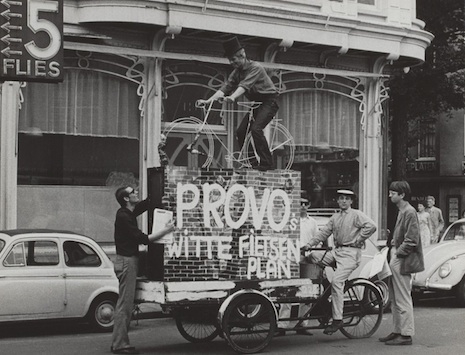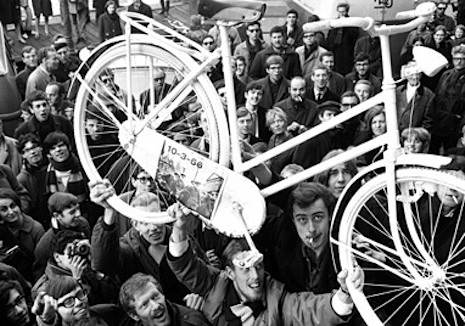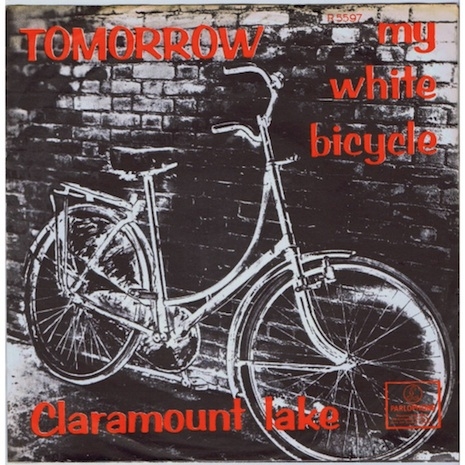
In the summer of 1965, Dutch designer and political activist Luud Schimmelpennink suggested a simple radical scheme that would eventually change the world. Schimmelpennink had an idea for creating a more sustainable environment by giving away free bicycles for communal use in Amsterdam’s city center. The suggestion was called the “White Bicycle Plan” and was part of a series of “White Plans” devised by the Dutch anarchist group Provo.
Provo is a Dutch word for “young trouble-maker” and was considered an appropriate name for a group of young anarchists to carry out political “happenings” and stunts that were inspired as much by DADA as by Herbert Marcuse. Provo was formed by artist and anti-smoking campaigner Robert Jasper Grootveld, writer and anarchist Roel van Duijn and activist Rob Stolk in May 1965. Their motivation, they explained, was to fight back against capitalist society that was “poisoning itself with a morbid thirst for money,” where its citizens were “being brought up to worship Having and despise Being.”
Because this bureaucratic society is choking itself with officialdom and suppressing any form of spontaneity. Its members can only become creative, individual people through anti-social conduct.
Because the militaristic society is digging its own grave by a paranoid arms build-up. Its members now have nothing to look forward to but certain death by atomic radiation.
Provo attracted anarchists, beatniks, activists, hippies, philosophers and even “charlatans,” “scratchers and syphilitics, secret police, and other riff-raff.”

The group listed their beliefs as:
Provo has something against capitalism, communism, fascism, bureaucracy, militarism, professionalism, dogmatism, and authoritarianism. Provo has to choose between desperate, resistance and submissive extinction. Provo calls for resistance wherever possible. Provo realises that it will lose in the end, but it cannot pass up the chance to make at least one more heartfelt attempt to provoke society. Provo regards anarchy as the inspirational source of resistance. Provo wants to revive anarchy and teach it to the young. Provo is an image
In 1965, Provo announced their plan to stop all personal motorized transport within Amsterdam, making the streets safe for the public and only accessible by walking, cycling or public transport. Provo presented their proposal to the municipal authorities, suggesting that they should buy 20,000 white bicycles every year giving them away free for public use. This proposal was rejected by the local politicians. Provo then decided to supply 50 free bicycles themselves—this was the “Witte Fietsenplan” or “White Bicycle Plan.”
The White Bicycle Plan proposes to create bicycles for public use that cannot be locked. The white bicycle symbolizes simplicity and healthy living, as opposed to the gaudiness and filth of the authoritarian automobile.

The first white bicycle is given away.
However, as soon as these 50 white bicycles were made freely available they were impounded by the police on the grounds the bikes were not “lockable.” Apparently, all bikes in Amsterdam at that time had to be lockable. Undeterred by the police actions, Provo waited until the bikes were returned and they then fitted each bike with a simple combination lock with the number painted on the bike’s frame. Of course, some of the bikes were stolen, but the White Bicycle revolution had begun.
Provo’s ideas may seem obvious to us today, but in the 1960s, they were considered radical, threatening and dangerous to society. This was the start of a bicycle revolution that has spread across many European countries today, with bikes being readily (and often freely) available for use. In 2010, Glasgow-based art collective NVA launched a new “White Bicycle Plan” donating 50 bikes for use across the city.
Provo had other ideas that they publicized through their self-titled magazine. These included the “White Chimney Plan” which aimed to stop industrial pollution; the “White Women Plan” which was to offer free sex advice and contraceptives; the “White Chicken Plan” to disarm the police and give the public greater democratic control over police actions; the “White Kids Plan” which initiated shared parenting and organizing free childcare; the “White Housing Plan” to build affordable houses to stop homelessness and overcrowding; and the “White Car Plan” for electric cars.
Hardly any of these proposals seem strange or even radical today. However, Provo officially disbanded in May 1967, though their ideas continue to inspire today.

In 1967, a psychedelic pop band by the name of Tomorrow were sufficiently inspired by Provo’s actions to write and release the song “My White Bicycle.”
Riding all around the street
Four o’clock and they’re all asleep
I’m not tired and it’s so late
Moving fast everything looks great.My white bicycle. My white bicycle.
The band consisted included Keith West, Steve Howe and John “Twink” Alder—who all went on to work with bands like Yes, Pink Fairies, The Deviants, Asia and Hawkwind. The song was co-written by Keith West, who had a bigger hit (with another co-written song) that same year with his “Grocer Jack (Excerpt From A Teenage Opera).”
While Tomorrow had little success with their single “My White Bicycle,” it did become a hit for rock band Nazareth in 1975, with Dan McCafferty giving it his trademark vocal.